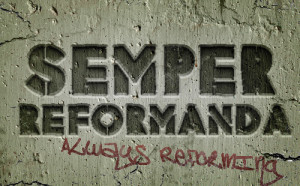Paul Washer:
Part 1
Part 2

 This excerpt is taken from Are We Together? by R.C. Sproul.
This excerpt is taken from Are We Together? by R.C. Sproul.
At the very heart of the controversy in the sixteenth century was the question of the ground by which God declares anyone righteous in His sight. The psalmist asked, “If you, O Lord, should mark iniquities, O Lord, who could stand?” (Ps. 130:3). In other words, if we have to stand before God and face His perfect justice and perfect judgment of our performance, none of us would be able to pass review. We all would fall, because as Paul reiterates, all of us have fallen short of the glory of God (Rom. 3:23). So, the pressing question of justification is how can an unjust person ever be justified in the presence of a righteous and holy God?
The Roman Catholic view is known as analytical justification. This means that God will declare a person just only when, under His perfect analysis, He finds that he is just, that righteousness is inherent in him. The person cannot have that righteousness without faith, without grace, and without the assistance of Christ. Nevertheless, in the final analysis, true righteousness must be present in the soul of a person before God will ever declare him just.
Whereas the Roman view is analytical, the Reformation view is that justification is synthetic. A synthetic statement is one in which something new is added in the predicate that is not contained in the subject. If I said to you, “The bachelor was a poor man,” I have told you something new in the second part of the sentence that was not already contained in the word bachelor. All bachelors are men by definition, but not all bachelors are poor men. There are many wealthy bachelors. Poverty and wealth are concepts that are not inherent in the idea of bachelorhood. So, when we say, “The bachelor was a poor man,” there is a synthesis, as it were.
When we say that the Reformation view of justification is synthetic, we mean that when God declares a person to be just in His sight, it is not because of what He finds in that person under His analysis. Rather, it is on the basis of something that is added to the person. That something that is added, of course, is the righteousness of Christ. This is why Luther said that the righteousness by which we are justified is extra nos, meaning “apart from us” or “outside of us.” He also called it an “alien righteousness,” not a righteousness that properly belongs to us, but a righteousness that is foreign to us, alien to us. It comes from outside the sphere of our own behavior. With both of these terms, Luther was speaking about the righteousness of Christ.
In this excerpt from Luther and the Reformation, R.C. Sproul describes the moment of awakening Martin Luther had as he read Romans 1:17, “For in it the righteousness of God is revealed from faith for faith, as it is written, ‘The righteous shall live by faith.’”
Transcript
He says, “Here in it,” in the gospel, “the righteousness of God is revealed from faith to faith, as it is written, ‘the just shall live by faith.’” A verse taken from the book of Habakkuk in the Old Testament that is cited three times in the New Testament. As Luther would stop short and say, “What does this mean, that there’s this righteousness that is by faith, and from faith to faith? What does it mean that the righteous shall live by faith?” Which again as I said was the thematic verse for the whole exposition of the gospel that Paul sets forth here in the book of Romans. And so, the lights came on for Luther. And he began to understand that what Paul was speaking of here was a righteousness that God in His grace was making available to those who would receive it passively, not those who would achieve it actively, but that would receive it by faith, and by which a person could be reconciled to a holy and righteous God.
Now there was a linguistic trick that was going on here too. And it was this, that the Latin word for justification that was used at this time in church history was—and it’s the word from which we get the English word justification—the Latin word justificare. And it came from the Roman judicial system. And the term justificare is made up of the word justus, which is justice or righteousness, and the verb, the infinitive facare, which means to make. And so, the Latin fathers understood the doctrine of justification is what happens when God, through the sacraments of the church and elsewhere, make unrighteous people righteous.
But Luther was looking now at the Greek word that was in the New Testament, not the Latin word. The word dikaios, dikaiosune, which didn’t mean to make righteous, but rather to regard as righteous, to count as righteous, to declare as righteous. And this was the moment of awakening for Luther. He said, “You mean, here Paul is not talking about the righteousness by which God Himself is righteous, but a righteousness that God gives freely by His grace to people who don’t have righteousness of their own.”
And so Luther said, “Woa, you mean the righteousness by which I will be saved, is not mine?” It’s what he called a justitia alienum, an alien righteousness; a righteousness that belongs properly to somebody else. It’s a righteousness that is extra nos, outside of us. Namely, the righteousness of Christ. And Luther said, “When I discovered that, I was born again of the Holy Ghost. And the doors of paradise swung open, and I walked through.”
 Dr. Sam Storms – original source if the sinner would take the initiative by humbly calling on God and “doing what lies within”, God would respond with the grace of justification. This doctrine, however, brought Luther little comfort, for he found himself despairing of the ability to fulfill the condition of the covenant. He conceived of the “righteousness of God” as an impartial divine attribute according to which God either forgave or condemned the individual based on the latter’s response to the terms of the covenant. God’s righteousness, therefore, was not gospel (i.e., good news) for Luther but an ever-present threat. The transformation in Luther’s theology came with the recognition that the “righteousness” of God was, in fact, that according to which God graciously provided the very righteousness he required.
Dr. Sam Storms – original source if the sinner would take the initiative by humbly calling on God and “doing what lies within”, God would respond with the grace of justification. This doctrine, however, brought Luther little comfort, for he found himself despairing of the ability to fulfill the condition of the covenant. He conceived of the “righteousness of God” as an impartial divine attribute according to which God either forgave or condemned the individual based on the latter’s response to the terms of the covenant. God’s righteousness, therefore, was not gospel (i.e., good news) for Luther but an ever-present threat. The transformation in Luther’s theology came with the recognition that the “righteousness” of God was, in fact, that according to which God graciously provided the very righteousness he required.
(2) Luther’s concept of justification is best seen in the phrase simul iustus et peccator, i.e., simultaneously both just and a sinner. Or again, the Christian is intrinsically (i.e., experientially) sinful, yet extrinsically (i.e., legally) righteous. In justification the sinner is passive (man is incapable of initiating the process leading to justification) and God is active. God in grace imputes to us a righteousness not our own and we in faith gratefully receive it (a faith, be it noted, that is no less a gift of God’s grace than the righteousness imputed through it).
(3) Justification means we are declared righteous, not made righteous. It is a change in our status, not our nature. That doesn’t mean justification has no relationship to progressive sanctification in which we are gradually, by grace, transformed inwardly into the very image of Jesus himself. They are distinct spiritual realities, but by no means separable. Those who are truly justified will be sanctified. This radical and fundamental distinction between justification as a status obtained by initial faith and the subsequent sanctification or transformation of one’s nature through grace was a profound insight of the Protestant Reformers and a return to the biblical doctrine itself.
(4) Justification is objective, not subjective. That is to say, it is something done for us, not in us. Or to say much the same thing, justification is forensic, not experiential. That is to say, it is a legal act, not an emotional feeling. Whereas we do not feel justification when it occurs, once we comprehend what God has done there may be great exhilaration of soul and spirit.
Thus, the differences between the Protestant and Roman Catholic views on justification are unmistakable. In Protestantism, justification is extrinsic (not intrinsic), alien to us (not inherent within us), objective or for us (not subjective or in us), punctiliar (it occurs at a point in time, when we believe, and is not progressive), forensic (not experiential), declarative (not transformative), entails the imputation of righteousness to us (not the impartation of righteousness in us), issues in (but is not the same as) sanctification, and pertains to our status (not our being) as we are reckoned righteous (not made righteous). Continue reading
 The Doctrine of Imputation: The Ligonier Statement on Christology, how about chocolate chip cookies and the gospel? That might be a new one for you.
The Doctrine of Imputation: The Ligonier Statement on Christology, how about chocolate chip cookies and the gospel? That might be a new one for you.
In the 1990s, a group of evangelical theologians and church leaders held talks with a group of Roman Catholic theologians and church leaders, and together they produced a statement titled Evangelicals and Catholics Together (ECT). In the aftermath of ECT, much discussion ensued regarding the Roman Catholic understanding of the gospel and how it relates to the understanding of the gospel historically affirmed by evangelicals, the heirs of the Protestant Reformation. The subject of justification by faith alone came up. This was, of course, one of the central issues of the Reformation.
We see how essential the doctrine of justification by faith alone was in the Reformation planks of sola fide (faith alone), sola gratia (grace alone), and solus Christus (Christ alone). These solas stress that salvation is by grace alone through faith alone in Christ alone. We must also see, however, that the Reformers emphasized a word that they found to be absolutely essential to the doctrine of justification by faith alone, which they in turn saw as essential to a right understanding of the gospel. That word is imputation.
During some of the talks around ECT, the historic differences between evangelicals and Roman Catholics over imputation came to the surface. Reformed theologian Michael Horton likened imputation to chocolate chips in the making of chocolate chip cookies. If you set out all the ingredients to make chocolate chip cookies but leave out the singular ingredient of chocolate chips, then you don’t have chocolate chip cookies when you pull the tray out of the oven. Likewise, you can have most of the key ingredients of the gospel. You can have the understanding that we are sinners. You can have an understanding of God as holy and just. You can have an understanding of Christ and His work on the cross. But if you leave out imputation, you don’t have the gospel. This is why the Reformers considered this word absolutely essential to a biblically faithful proclamation of the gospel. But what does this word imputation mean?
The word imputation comes directly from the Latin. It is an accounting term; it means “to apply to one’s account.” Expenses are debited and income is credited. The old King James word is “reckon.”
In theological terms, we speak of a double imputation that takes place in justification. This double imputation is taught in texts such as 1 Corinthians 5:21, where Paul says plainly, “For our sake he made him to be sin who knew no sin, so that in him we might become the righteousness of God.” Here we read that our sin is imputed to Christ. We are the offending party. He is guiltless. He perfectly kept the law. Yet, on the cross, God poured out His wrath on Christ. Why? Because our sin was imputed to Christ. Christ took upon Himself our sin. Our great debit was put on His account. Christ paid the horrific penalty as the cup of God’s wrath was poured out upon Him. Continue reading
 Here’s an excellent article by R. J. Grune entitled “g.rand, a.k. uzer, & howe” – original source here.
Here’s an excellent article by R. J. Grune entitled “g.rand, a.k. uzer, & howe” – original source here.
Satan is the world-class accuser. If he ran a law firm, he’d be its first and most powerful partner. His specialty is accusing and destroying people. Like you. From the moment you’re accused, he’s prowling around in front of the jury, ready to attack and make his case. He never comes to court unprepared. He’s got evidence, eyewitnesses, and testimonies to put you away for life. He calls your friends on the stand to testify about your lies and cover-ups. He puts your family on the stand to reveal your weakness before the jury. His evidence submitted before the court and in full public view includes e-mails, voice-mails, and even off-the-record conversations that make you look like a dirt-bag.
And The Accuser doesn’t stop there. Witnesses for the prosecution continue until you are crushed with guilt and your character is shamed beyond recovery. You’re buried under a burden of evidence and testimony with no way out. The accused – you – fight to defend yourself. After all, you got yourself into the mess, and you can at least mount a defense to get yourself out.
You think about hiring a lawyer, but opt to make your own defense, boldly ignoring the lawyer’s axiom “He who represents himself has a fool for a client.” With your back against the wall facing brutal accusations, what other choice do you have? Is there really any better person to help you avoid a guilty verdict? Can anyone really justify your actions better than you? If there’s a chance that you will be found innocent, you have the best shot at making it happen. That’s foolishness, though. You’re not going to get off, and you know it. The accusations are accurate. You might as well just plead guilty. Your efforts to self-justify and refute the evidence are hopeless.
Counter intuitively, it’s in this hopelessness that God meets you in the courtroom where Satan has made his airtight case against you. Jesus arrives as your advocate. You don’t have to make a defense. Revelation 12:10-11 says, “For the accuser of our brothers and sisters, who accuses them before our God day and night, has been hurled down. They triumphed over him by the blood of the Lamb.” 1 John 2 says, “But if anybody does sin, we have an advocate with the Father—Jesus Christ, the Righteous One.” When Jesus makes his entrance into the courtroom, he comes with witnesses, testimonies, and evidence to support you. Oddly, though, his evidence doesn’t testify to your righteousness but to his. Jesus transforms the proceedings by exchanging his innocence for your guilt. He mitigates the charges against you by offering his own life – his active obedience, his sacrificial death, and his victorious resurrection – all on your behalf. This is an unbeatable tactic. The accuser doesn’t stand a chance. When you are clearly guilty, Jesus gives you a new shot at life, and there’s nothing Satan and his team can do to take that from you.
But the accuser is clever. Even after the case is closed, Satan knows exactly the accusations to whisper to cause you to question your innocence. He knows what wounds to re-open. The accuser is an expert at bringing up forgiven sins. He is an expert in convincing you that your case might be re-opened, perhaps by God himself. Maybe God will change his mind. Maybe your sin is too much for even Jesus to cover.
While Satan continues to accuse and sow doubt, the law is the law. There is no double jeopardy in the Kingdom of God. In Romans 8 Paul writes, “Who will bring any charge against those whom God has chosen. It is God who justifies.” When Jesus says, “Not guilty,” that is what you are. The case is closed. The gavel falls. Court adjourned.
 Dr. Sam Storms has written a series of articles which be reconciled to God and made acceptable in his sight?”
Dr. Sam Storms has written a series of articles which be reconciled to God and made acceptable in his sight?”
There simply is no more eternally important question that any man or woman can ask and then answer than this: “How might I, a hell-deserving sinner, be reconciled to God and made acceptable in his sight?” Or we might pose the question in yet another way: “How might I, a man/woman who is undeniably unrighteous and thus deserving of eternal judgment, be made righteous in the sight of God?” Other questions might feel more pressing or more practical, but rest assured that nothing else in all of life matters much in comparison with the issue of how we can be made right with God and thus assured of eternal life in his presence.
To put it another way, what is it that commends us to God? On what grounds or for what reason does God receive us as his children and look on us with a smile of approval and joy?
You and I will make numerous colossally stupid decisions during our years on earth. But we will, in the end, survive them all. None of them is quite as devastating as we think. Whether it’s choosing the wrong job or purchasing the wrong car or making bad friends, as painful as such choices can be, we will survive them. But the issue that we encounter in James 2:14-26 is of an eternally different order. The conclusion you draw concerning the meaning of this passage and how you live your life as a result will bear consequences into eternity. Not just for the next few weeks, or even years, but for eternity. Continue reading
 This article by Dr. J. I. Packer, found in “Concise Theology: A Guide to Historic Christian Beliefs (Carol Stream: Tyndale House Publishers, 1993, pp. 164-66) is one of the most concise and accurate descriptions of justification I have come across. His explanation of the Roman Catholic view and how it differs from the Protestant view is also very useful.
This article by Dr. J. I. Packer, found in “Concise Theology: A Guide to Historic Christian Beliefs (Carol Stream: Tyndale House Publishers, 1993, pp. 164-66) is one of the most concise and accurate descriptions of justification I have come across. His explanation of the Roman Catholic view and how it differs from the Protestant view is also very useful.
“The doctrine of justification, the storm center of the Reformation, was a major concern of the apostle Paul. For him it was the heart of the gospel (Rom. 1:17; 3:21-5:21; Gal. 2:15-5:1) shaping both his message (Acts 13:38-39) and his devotion and spiritual life (2 Cor. 5:13-21; Phil. 3:4-14). Though other New Testament writers affirm the same doctrine in substance, the terms in which Protestants have affirmed and defended it for almost five centuries are drawn primarily from Paul.
Justification is a judicial act of God pardoning sinners (wicked and ungodly persons, Rom. 4:5; 3:9-24), accepting them as just, and so putting permanently right their previously estranged relationship with himself. This justifying sentence is God’s gift of righteousness (Rom. 5:15-17), his bestowal of a status of acceptance for Jesus’ sake (2 Cor. 5:21).
God’s justifying judgment seems strange, for pronouncing sinners righteous may appear to be precisely the unjust action on the judge’s part that God’s own law forbade (Deut. 25:1; Prov. 17:15). Yet it is in fact a just judgment, for its basis is the righteousness of Jesus Christ who as ‘the last Adam’ (1 Cor. 15:45), our representative head acting on our behalf, obeyed the law that bound us and endured the retribution for lawlessness that was our due and so (to use a medieval technical term) ‘merited’ our justification. So we are justified justly, on the basis of justice done (Rom. 3:25-26) and Christ’s righteousness reckoned to our account (Rom. 5:18-19).
God’s justifying decision is the judgment of the Last Day, declaring where we shall spend eternity, brought forward into the present and pronounced here and now. It is the last judgment that will ever be passed on our destiny; God will never go back on it, however much Satan may appeal against God’s verdict (Zech. 3:1; Rev. 12:10; Rom. 8:33-34). To be justified is to be eternally secure (Rom. 5:1-5; 8:30).
The necessary means, or instrumental cause, of justification is personal faith in Jesus Christ as crucified Savior and risen Lord (Rom. 4:23-25; 10:8-13). This is because the meritorious ground of our justification is entirely in Christ. As we give ourselves in faith to Jesus, Jesus gives us his gift of righteousness, so that in the very act of ‘closing with Christ,’ as older Reformed teachers put it, we receive divine pardon and acceptance which we could not otherwise have (Gal. 2:15-16; 3:24).
Official Roman Catholic theology includes sanctification in the definition of justification, which it sees as a process rather than a single decisive event, and affirms that while faith contributes to our acceptance with God, our works of satisfaction and merit contribute too. Rome sees baptism, viewed as a channel of sanctifying grace, as the primary instrumental cause of justification, and the sacrament of penance, whereby congruous merit is achieved through works of sanctification, as the supplementary restorative cause whenever the grace of God’s initial acceptance is lost through mortal sin. Congruous, as distinct from condign, merit means merit that it is fitting, though not absolutely necessary, for God to reward by a fresh flow of sanctifying grace. On the Roman Catholic view, therefore, believers save themselves with the help of the grace that flows from Christ through the church’s sacramental system, and in this life no sense of confidence in God’s grace can ordinarily be had. Such teaching is a far cry from that of Paul.”
 Mike Riccardi, in an article entitled “Semper Reformanda: Christ Will Do Everything, or He Will Do Nothing” writes:
Mike Riccardi, in an article entitled “Semper Reformanda: Christ Will Do Everything, or He Will Do Nothing” writes:
Reformation Day is fast upon us. Next Saturday will be the 498th anniversary of Martin Luther famously nailing his 95 Theses to the Castle Church door in Wittenberg, Germany, and kick-starting the Protestant Reformation as a result. Because of that, there will likely be many posts in the Christian blogosphere celebrating the recovery of the biblical Gospel from the perversions of Roman Catholic theology. And because of that, there will likely be many Romanist sympathizers who chide us Protestants as divisive, overly-narrow, unity-destroying, and judgmental. They’ll say something like this (a comment we’ve received before at The Cripplegate):
This is what drives me nutty about Christianity. We all believe in the Bible, Jesus Christ, the road to salvation and the Resurrection. Do I believe exactly as you do? I’m sure I don’t, but I don’t believe you’re any less Christian than I am. We need to understand that there’s more that unites us than divides us.
The problem, of course, is that Protestants and Catholics don’t all believe the same things about the most foundational aspects of the Christian Gospel. That means that we’re not just other Christians from another “denomination.” When two people disagree on issues as fundamental as the basis and instrument of salvation (i.e., Christ’s righteousness alone imputed through faith alone, versus Christ’s righteousness imparted through faith and our works) and whether good works are part of the ground of our righteousness or merely the evidence——one of them is a Christian and the other isn’t.
We see that proven plainly by the way the Apostle Paul spoke about the Judaizers. The Judaizers were professing Christians who “began teaching the brethren, ‘Unless you are circumcised according to the custom of Moses, you cannot be saved’” (Acts 15:1). In other words, they taught that the righteousness of Christ received by faith alone is not enough to secure your salvation. To be sure, you need to have faith in Jesus; they wouldn’t deny faith in Christ is necessary for salvation. They would just say it was insufficient; instead, you must “complete” your justification by performing certain good deeds. In other words, the Judaizers sought to add personal works of righteousness to the ground of their justification. They were the first-century counterpart to the Roman Catholic Church, which teaches, “If anyone says that the [justification] received is not preserved and . . . increased before God through good works but that those works are merely the fruits and signs of justification obtained, but not the cause of the increase, let him be anathema” (Council of Trent, Session 6, Canon 24). For the Judaizers, those works were circumcision and the other Mosaic ceremonies. For the Catholics, those works are baptism, participation in the Eucharist, and the other sacraments.
Severed from Christ
But notice how Paul speaks of these teachers in the New Testament. He does not count them to be merely misled brothers in Christ. The churches of Galatia hadn’t even become propagators of this doctrine yet; Paul wrote to them while they were simply being tempted to believe in it. And even then Paul writes to them and says, “I fear for you, that perhaps I have labored over you in vain” (Gal 4:11). That is to say, he fears they may not have ever been truly saved (cf. 1 John 2:19).
He goes on to say that if they receive circumcision—that is, if they allow even the smallest of religious rituals to become part of the ground of their confidence for salvation—“Christ will be of no benefit to you” (Gal 5:2). Notice, he does not say, “Christ will be of some benefit to you, just not as much as otherwise. You’ll differ a little doctrinally, but we can still rejoice in our unity.” No. Paul says that everyone who receives circumcision as a ground of their righteousness is obligated to keep the whole law (Gal 5:3). In other words, if you want your righteousness to be based even partly on works, you’re under obligation to earn the whole thing by works (cf. Jas 2:10). And in that case, since you would then be seeking to be justified by law, it would be right to speak of you as “severed from Christ, . . . fallen from grace” (Gal 5:4). You would be one of those whom the Apostle John said “went out from us, but . . . were not really of us” (1 John 2:19).
Finally, Paul speaks about those who preach such a soul-destroying false-gospel. His conclusion regarding such a teacher is: “he will bear his judgment” (Gal 5:10). Again, this is not merely an estranged brother. He is not one of Christ’s sheep, just from another fold. He will bear his judgment. He will face the condemnation of Almighty God that no true believer can ever face (cf. Rom 8:1). Continue reading
Romans 1:16 For I am not ashamed of the gospel, because it is the power of God that brings salvation to everyone who believes: first to the Jew, then to the Gentile. 17 For in the gospel the righteousness of God is revealed—a righteousness that is by faith from first to last, just as it is written: “The righteous will live by faith.” (NIV)
Martin Luther was a man plagued in conscience because of his sin, knowing God had to be just in punishing him. Light broke through the dark, foreboding clouds when he came to understand Romans 1:17.